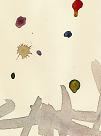
The first century of English-language haiku has created a strong foundation with great variety. Though there have been a number of individualistic bursts of influential experimentation, English-language haiku has, however, come to a point of stagnation-a state of orthodoxy, where molds and the clichés are expected and, it seems, desired. Expectations regarding form and content have atrophied, with narrow definitions of nature and reality, emphasizing hyper-literalism and objectivity. In affect, many techniques and topics such as subjectivity and the imagination, as well as many other methodologies, have become marginalized and devalued. The result is English-language haiku that are mostly formulaic and homogenous, more nostalgic than visionary.
Though grounded with great love and affection for both the haiku traditions of Japan and the West, John Sandbach's haiku represent a clear break and, hopefully, a new, influential, and open beginning in English-language haiku composition that welcomes and values all methodologies, aesthetics and topics, seeing infinite possibilities and equality in every path. Breaking away from what has become the traditional standards in English haiku, Sandbach creates new, fresh and exciting directions and possibilities for composition, expanding the English-language haiku poet's toolbox. His work plays with a wide range of subject matter: the metaphysical, astrology, fantasy, the surreal and the absurd, the mythological, fairy tales, alchemy, the imagination, the unusual and the strange, the subconscious, dreams, transformation, and the mythopoeic, as well as the natural world (the wild) and seasonal changes. As Ban'ya Natsuishi has noted before about Sanbach's work (Step Into Sky), his haiku are "spacious and cosmic." His work is also fearless, unafraid of delving deep within the heart/mind/spirit, or the the vast outer reaches of our universe, and therefore ourselves. Once there, he finds connections and moments, images and words, and brings them back to us through the beauty, simplicity and evanescence of haiku poems. He does not simply embrace Western poetry, poetics, art, literature, philosophy and religion, but-not unlike Japanese gendai haiku poets of the 20th century-attempts to elevate and spiritualize them by fusing the East and the West (as well as the North and South) together like an alchemist. John Sandbach's haiku challenge, surprise and delight, and exemplify the wisdom of Bashō: "Haiku is for freedom."
| John Sandbach |
| 978-8182531536 |
| $12 |
| John Sandbach |
| 978-81-8253-143-7 |
| $12 |